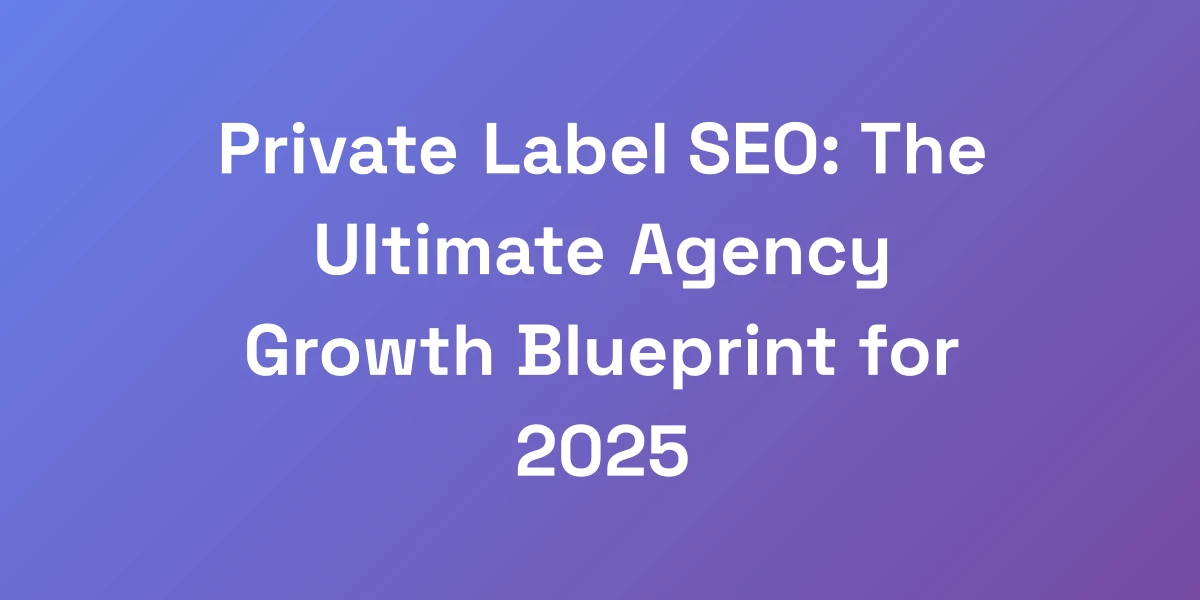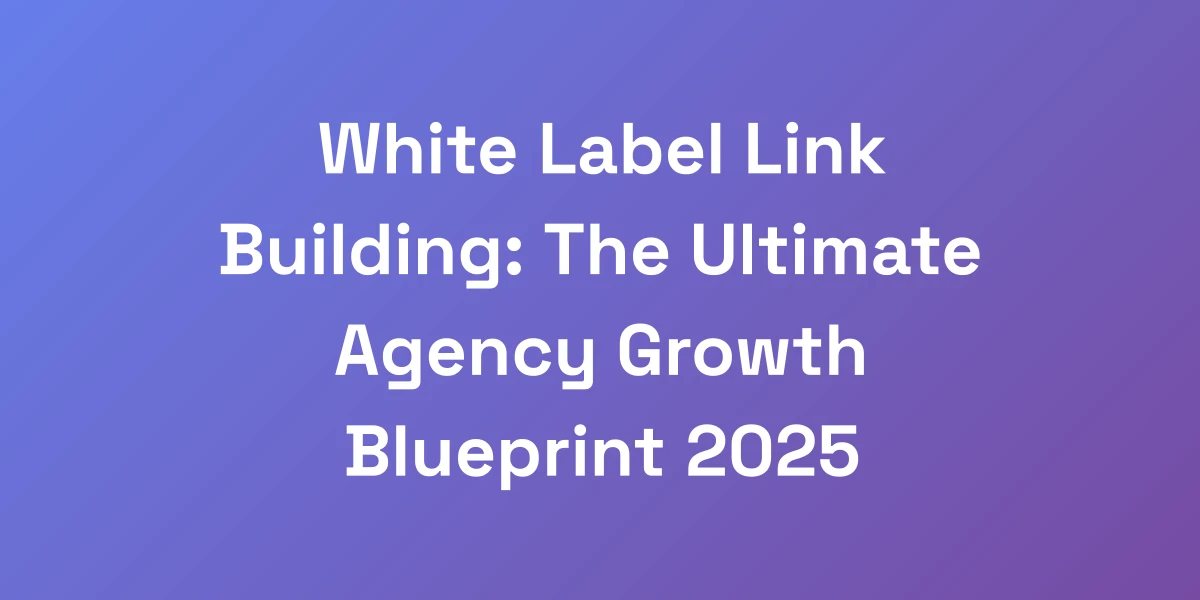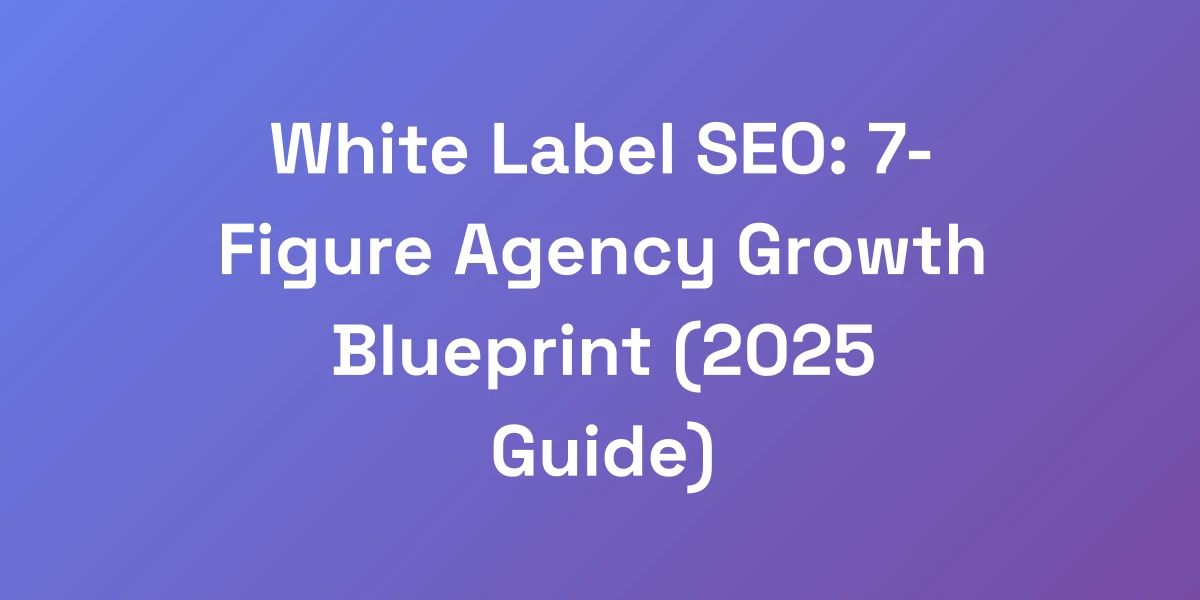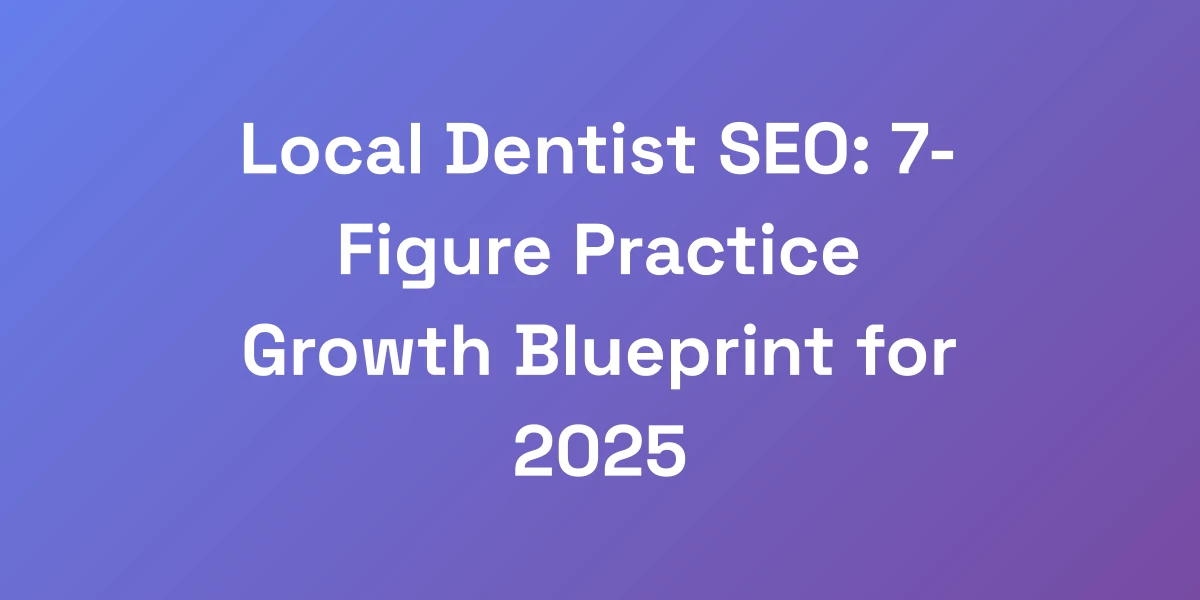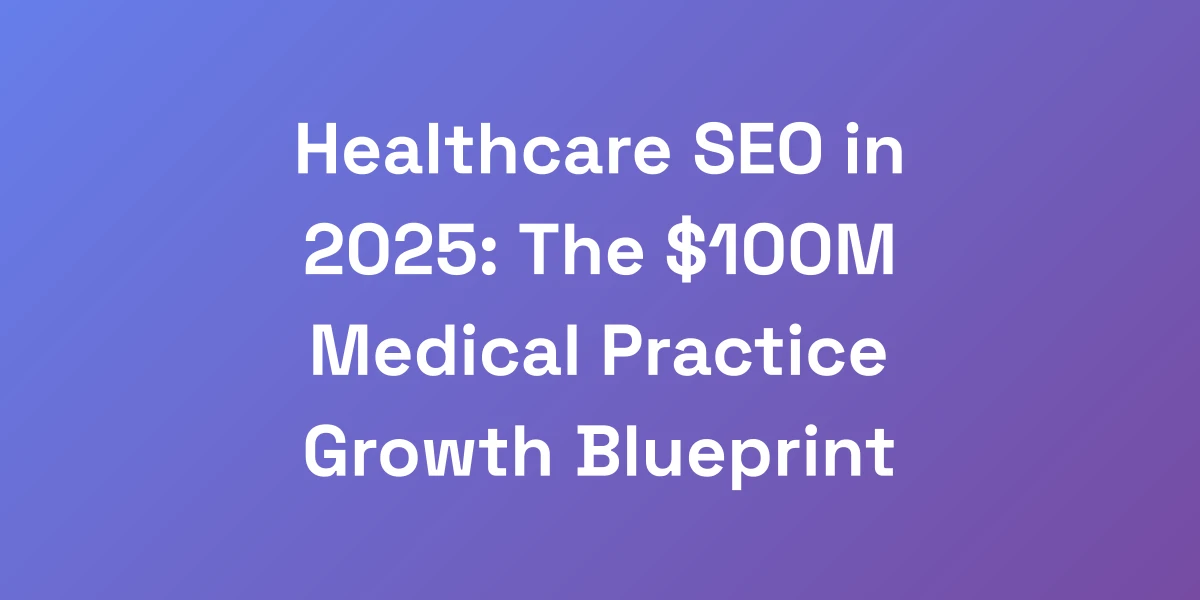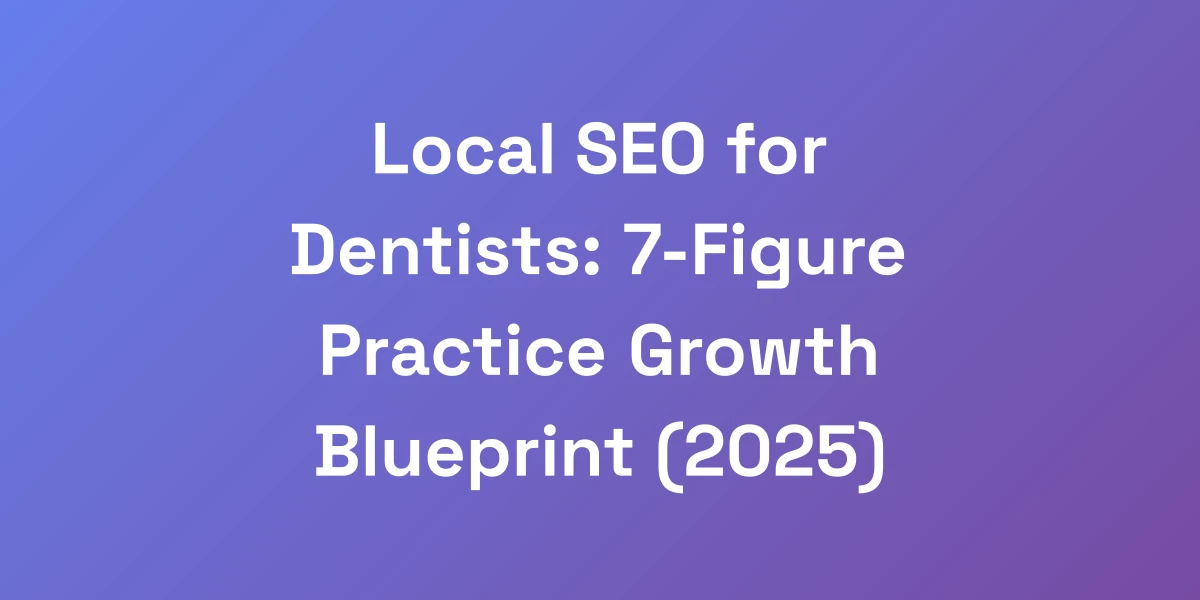
White Label Local SEO: The Ultimate Agency Growth Blueprint (2025)
Mar 1, 2025 | By [email protected]
Introduction
Let’s get real for a second – running an agency is like juggling flaming swords while riding a unicycle. The pressure to deliver top-notch services without burning out or breaking the bank is immense. So, how do we scale without losing our sanity or our clients?
Enter White Label Local SEO, the secret sauce that savvy agencies are leveraging to skyrocket their growth without the headache of doing everything in-house. Imagine doubling or even tripling your service offerings without hiring a single new employee. Sounds like a fantasy, right? Well, it’s not.
White label local SEO is the ultimate hack for expanding your agency’s capabilities, enhancing client satisfaction, and boosting your bottom line. We’re talking about a full-stack solution that works behind the scenes, delivering stellar results under your brand’s name. But why is it such a game-changer, and how can you harness its power to dominate your market?
In this blueprint, we’ll dive deep into why white label local SEO is your agency’s best-kept secret, how to choose the right partner, and strategies to maximize your ROI. Ready to transform your agency’s growth trajectory? Let’s get into it.
Why White Label Local SEO Is Your Agency’s Secret Weapon
Let me shoot straight with you – I’ve seen hundreds of agencies crash and burn trying to do everything in-house. White label local SEO is the smartest hack I’ve discovered for scaling an agency without losing your mind (or your shirt). Think about it: you get to double or triple your service offerings without hiring a single new employee. It’s like having a Navy SEAL team on standby, except instead of tactical ops, they’re crushing local search rankings for your clients. The numbers don’t lie – agencies using white label services are growing 3x faster than those trying to build everything from scratch.
The Growing Demand for Local SEO Services
The demand for local SEO is skyrocketing as businesses recognize the importance of appearing in local search results. With the global SEO market projected to grow to $129.6 billion by 2030 at a CAGR of 8.3%, the local SEO segment is poised for significant expansion. Local businesses are investing heavily in SEO to ensure they appear in front of potential customers right when they need them.
Consumers are increasingly using mobile devices to search for services “near me.” This shift in behavior means that local SEO isn’t just a nice-to-have; it’s a necessity. Agencies that tap into this demand can provide immense value to their clients, making their services indispensable.
- Statistics: Local SEO services accounted for 22% of agency revenue in 2023, highlighting the lucrative potential.
- Example: A local bakery saw a 150% increase in foot traffic after optimizing their Google Business Profile.
Understanding the White Label Business Model
White label services allow agencies to outsource specific functions while maintaining their brand identity. In the context of local SEO, this means partnering with a specialized provider who handles all SEO tasks under your agency’s name. This model offers several advantages:
- Scalability: Easily expand your service offerings without the need for additional hires.
- Expertise: Leverage the expertise of seasoned SEO professionals without the overhead costs.
- Focus: Concentrate on your core competencies, whether that’s client acquisition, strategy, or other services.
By understanding and implementing a white label business model, agencies can deliver high-quality local SEO services efficiently and effectively.
Cost-Benefit Analysis: In-House vs. White Label
When deciding between in-house SEO and white label services, it’s crucial to weigh the costs and benefits of each approach. While building an in-house team might seem appealing, it comes with significant challenges:
- High Overheads: Salaries, training, and software tools add up quickly.
- Time-Consuming: Recruiting and retaining skilled SEO professionals is no easy feat.
- Limited Flexibility: Scaling your services to meet client demands can be slow and cumbersome.
On the flip side, white label local SEO offers:
- Cost Efficiency: No need to worry about salaries or training costs.
- Rapid Scaling: Quickly ramp up your service offerings to meet client needs.
- Access to Expertise: Tap into a pool of SEO experts without the hassle.
The clear takeaway? White label services provide a more agile and cost-effective solution for agencies looking to grow. Similarly, leveraging affordable SEO for small business can unlock value without breaking the bank.
Success Stories: Agencies That Scaled Using White Label Services
Nothing speaks louder than success stories. Take White Shark Media, for example. They partnered with white label SEO providers to manage their local SEO campaigns, resulting in a 200% increase in client acquisition and a 300% boost in revenue within two years. Another agency, BrightLocal Partners, used white label services to expand their offerings quickly, allowing them to take on larger clients and achieve a six-figure revenue milestone faster than their competitors.
These success stories are not anomalies. Agencies that strategically implement white label local SEO can achieve remarkable growth by leveraging external expertise and focusing on client relationships.
Key Market Statistics and Growth Projections
Here are some compelling statistics that highlight the booming white label local SEO market:
- The global SEO market grew from $68.27 billion in 2022 to $74 billion in 2023, with a projected increase to $129.6 billion by 2030.
- The SEO services market is expected to grow from $90.35 billion in 2024 to $106.9 billion in 2025, at a CAGR of 18.3%.
- White label SEO services accounted for 22% of agency revenue in 2023, underscoring their significance in the industry.
These numbers aren’t just numbers – they represent opportunities for agencies to tap into a rapidly expanding market and secure their place as leaders in local SEO.
Breaking Down White Label Local SEO Services
Here’s the deal – white label local SEO isn’t just about throwing some keywords on a page and calling it a day. We’re talking about a full-stack solution that’s going to make your agency look like a million bucks. The best white label partners offer everything from Google Business Profile optimization to local citation building, and they do it all under your brand. I’ve personally vetted dozens of providers, and let me tell you, the difference between a Toyota Corolla to a Tesla Model S – they’ll both get you there, but one does it with style and automation.
Core Service Components
A comprehensive white label local SEO service should encompass the following core components:
- Google Business Profile Optimization: Ensuring accurate and complete profiles to enhance visibility in local searches.
- Local Citation Building: Creating consistent business listings across various online directories.
- On-Page SEO: Optimizing website content for relevant local keywords and ensuring technical SEO best practices.
- Review Management: Encouraging and managing online reviews to build credibility and improve rankings.
- Local Link Building: Acquiring high-quality backlinks from local sources to boost authority.
Each of these components plays a critical role in driving local search visibility and, ultimately, client success.
White Label Tools and Reporting Platforms
Effective white label SEO relies on robust tools and reporting platforms. These tools not only streamline the SEO process but also provide transparent reporting that you can offer to your clients. Additionally, leveraging auto SEO software can further enhance your agency’s efficiency and effectiveness:
- Keyword Research Tools: Tools like SEMrush or Ahrefs to identify local keywords.
- Reporting Platforms: Customized dashboards that allow you to present data in your brand’s voice.
- Project Management Tools: Platforms like Trello or Asana to manage SEO tasks and workflows efficiently.
In addition to these tools, utilizing AI SEO tools offers unparalleled optimization capabilities. Moreover, integrating AI tools for SEO can significantly boost your reporting and data analysis.
Customization and Branding Options
One of the standout benefits of white label services is the ability to customize and brand the SEO efforts as your own. This means:
- Branded Reports: Delivering performance reports that carry your agency’s branding, not the white label provider’s.
- Tailored Strategies: Developing SEO strategies that align with your clients’ unique business goals.
- Flexible Packages: Offering customized service packages that fit various client needs and budgets.
Customization ensures that your clients perceive these services as an extension of your own agency, maintaining your brand integrity and trust.
Service Delivery Timeline
Understanding the typical service delivery timeline is crucial for setting client expectations and managing workflows:
- Initial Audit and Setup: 1-2 weeks for conducting a comprehensive SEO audit and setting up necessary accounts.
- Implementation: 3-6 months of ongoing optimization, including on-page SEO, citation building, and link acquisition.
- Reporting and Adjustments: Monthly reporting with adjustments based on performance data.
Clear timelines help in providing transparency and ensuring that both your agency and your clients are aligned on the SEO journey.
Quality Control Measures
Maintaining high-quality standards is non-negotiable when it comes to white label SEO. Implementing robust quality control measures ensures consistency and excellence:
- Regular Audits: Periodic audits to ensure SEO practices are up to date with the latest standards.
- Performance Monitoring: Continuous tracking of key performance indicators (KPIs) to measure success.
- Client Feedback: Gathering and incorporating client feedback to refine and improve services.
These measures ensure that the SEO services delivered meet or exceed client expectations consistently.
Pricing Models and Markup Strategies
Understanding pricing models and implementing effective markup strategies is essential for profitability:
- Fixed Pricing: Offering fixed packages that offer predictable costs and services.
- Tiered Pricing: Creating different service tiers to cater to various client budgets and needs.
- Markup Strategies: Typically, agencies mark up white label services by 100-200% to maintain competitive pricing while ensuring healthy profit margins.
Strategic pricing not only makes your services competitive but also ensures sustainable profitability as you scale.
Selecting the Perfect White Label Partner
Listen up, because this is where most agencies mess up. Choosing a white label partner is like picking a business spouse – get it wrong, and you’re in for a world of hurt. I’ve seen agencies lose six-figure clients because their white label partner dropped the ball. You need someone who’s not just good at SEO, but understands your business goals and can scale with your growth. The key is finding a partner who’s transparent about their processes, has a proven track record, and most importantly, makes you look good in front of your clients.
Essential Evaluation Criteria
When evaluating potential white label partners, consider the following criteria:
- Experience and Expertise: Look for partners with a solid track record in local SEO and a deep understanding of various industries.
- Client Portfolio: Review their existing clients to ensure they have experience relevant to your target market.
- Service Offerings: Ensure their services align with your needs, whether it’s Google Business Profile optimization, citation building, or review management.
- Communication: Assess their communication style and responsiveness to ensure smooth collaboration.
- Flexibility: The ability to customize services and adapt to your agency’s specific requirements is crucial.
Red Flags to Watch Out For
While searching for the perfect partner, be wary of the following red flags:
- Lack of Transparency: If they’re not open about their processes or pricing, it’s a major warning sign.
- Poor Communication: Delayed responses or unclear communication can lead to misunderstandings and project delays.
- Inconsistent Results: Look for a history of fluctuating performance – consistency is key in SEO.
- No Case Studies or References: Legitimate providers should have case studies or references to prove their success.
- One-Size-Fits-All Approach: Avoid partners who don’t tailor their services to fit your specific needs and client goals.
Contract Terms and Service Level Agreements
Having clear contract terms and Service Level Agreements (SLAs) is essential in protecting your agency and ensuring quality service delivery:
- Scope of Services: Clearly define what services are included and any additional costs for extra services.
- Turnaround Times: Set realistic timelines for deliverables to manage client expectations effectively.
- Performance Metrics: Establish key performance indicators (KPIs) that will be used to measure success.
- Termination Clauses: Ensure there are clear conditions under which either party can terminate the agreement.
- Confidentiality: Protect your client data and proprietary information through strong confidentiality clauses.
Communication Protocols
Effective communication is the backbone of a successful white label partnership. Establish clear communication protocols to ensure collaboration runs smoothly:
- Regular Updates: Schedule consistent check-ins and updates to stay informed about progress and any potential issues.
- Point of Contact: Designate a primary contact person for streamlined communication and accountability.
- Reporting Frequency: Determine how often reports will be delivered and what key metrics will be included.
- Feedback Loops: Implement systems for providing and receiving feedback to continuously improve service quality.
These protocols ensure that communication remains clear, consistent, and productive, fostering a strong partnership between your agency and the white label provider.
Case Study Analysis
Take the example of White Shark Media. They partnered with a white label SEO provider to handle their local SEO campaigns. By leveraging the provider’s expertise, they were able to scale their operations without increasing overhead costs. This partnership resulted in a 150% increase in client acquisition and a 200% boost in revenue within two years. The key to their success was the white label partner’s ability to deliver consistent, high-quality SEO services that aligned with White Shark Media’s business goals.
ROI Measurement Methods
Measuring the return on investment (ROI) for white label local SEO services is vital to demonstrate value to your clients and justify the expenditure. Here are effective methods to track ROI:
- Increased Traffic: Monitor the rise in organic traffic to your clients’ websites as a direct result of SEO efforts.
- Conversion Rates: Track how SEO improvements lead to higher conversion rates, whether it’s lead generation, sales, or other key actions.
- Client Retention Rates: A noticeable improvement in SEO performance often leads to higher client retention rates.
- Revenue Growth: Calculate the increase in your clients’ revenue attributable to enhanced local search visibility.
- Cost Savings: Compare the costs of white label services against in-house SEO efforts to highlight cost efficiency.
By systematically tracking these metrics, you can effectively demonstrate the value of white label local SEO services to your clients.
Implementing White Label Services in Your Agency
Here’s where the rubber meets the road. Implementing white label services isn’t just about signing a contract and watching the money roll in. You need a solid onboarding strategy and clear processes. The agencies that crush it with white label services are the ones that treat their provider as a true extension of their team. They’ve got seamless communication channels, clear expectations, and systems for quality control. I’ve seen agencies 10x their client base in 18 months just by nailing this part of the equation.
Client Onboarding Process
A smooth client onboarding process sets the tone for successful SEO campaigns. Here’s how to streamline it:
- Initial Consultation: Understand the client’s business, target audience, and specific local SEO goals.
- Audit and Analysis: Conduct a comprehensive SEO audit to identify strengths, weaknesses, and opportunities.
- Strategy Development: Create a tailored SEO strategy based on audit findings and client objectives.
- Implementation Plan: Outline a clear plan of action, including timelines and deliverables.
- Client Approval: Get client approval on the proposed strategy to ensure alignment and buy-in.
By meticulously managing the onboarding process, you ensure that both your agency and your clients are set up for SEO success from the start.
Team Integration Strategies
Integrating your agency’s team with the white label provider is crucial for seamless collaboration. Here’s how to do it right:
- Clear Roles and Responsibilities: Define who handles what to avoid overlaps and gaps.
- Collaborative Tools: Use project management and communication tools like Slack, Trello, or Asana to coordinate efforts.
- Regular Meetings: Schedule regular meetings to discuss progress, address issues, and adjust strategies as needed.
- Shared Goals: Align your team and the white label provider’s goals to ensure everyone is working towards the same objectives.
A well-integrated team ensures that SEO projects run smoothly and clients receive consistent, high-quality service.
Workflow Management
Effective workflow management is the backbone of successful white label SEO implementation. Here’s how to optimize your workflows:
- Standard Operating Procedures (SOPs): Develop SOPs for each SEO task to ensure consistency and efficiency.
- Task Automation: Automate repetitive tasks using tools like Zapier or HubSpot to save time and reduce errors.
- Milestone Tracking: Set and track milestones to monitor progress and stay on schedule.
- Resource Allocation: Allocate resources effectively to ensure that each project has what it needs to succeed.
Streamlining your workflows not only boosts productivity but also enhances the quality of SEO services delivered to clients.
Client Communication Best Practices
Maintaining open and transparent communication with clients is essential for building trust and ensuring satisfaction. Here are best practices to follow:
- Regular Updates: Provide consistent updates on SEO progress and performance metrics.
- Clear Reporting: Use easy-to-understand reports that highlight key achievements and areas for improvement.
- Responsive Support: Be available to address client questions and concerns promptly.
- Proactive Recommendations: Offer proactive suggestions for further optimization and growth opportunities.
Effective client communication fosters strong relationships and ensures that clients feel valued and informed throughout the SEO process.
Performance Tracking Systems
Tracking performance is crucial to measure the success of your SEO efforts and make informed decisions. Implement the following systems:
- Analytics Tools: Utilize tools like Google Analytics and Google Search Console to monitor website traffic and search performance.
- Custom Dashboards: Create dashboards that aggregate key metrics, making it easy to track progress at a glance.
- Regular Reviews: Conduct regular performance reviews to assess the effectiveness of SEO strategies and make necessary adjustments.
- Client Reporting: Share performance data with clients in a clear and actionable format.
These tracking systems help you stay on top of your SEO campaigns and ensure continuous improvement.
Scaling Operations Successfully
Scaling your operations with white label SEO requires strategic planning and efficient execution. Here’s how to scale successfully:
- Standardize Processes: Develop standardized processes for onboarding, implementation, and reporting to ensure consistency as you grow.
- Invest in Technology: Leverage advanced SEO tools and automation to handle increased workloads without compromising quality.
- Expand Service Offerings: Gradually introduce new services such as content marketing or PPC to provide comprehensive solutions to clients.
- Build a Strong Team: As you scale, ensure you have the right team members in place to support increased client demands.
By following these strategies, you can scale your agency’s operations while maintaining high standards of service delivery.
Maximizing ROI with White Label Local SEO
Let’s talk money, because that’s why we’re all here. The beauty of white label local SEO is the profit margin potential. I’m seeing smart agencies marking up services by 100-200% while still staying competitive. But here’s the secret sauce: it’s not just about markup. It’s about packaging and positioning. The agencies making bank are the ones that bundle services strategically, create irresistible offers, and know exactly how to communicate value to their clients.
Pricing Strategy Development
Developing a robust pricing strategy is crucial for maximizing ROI. Here’s how to approach it:
- Understand Your Costs: Calculate the total cost of white label services, including any additional expenses like tools or software.
- Competitive Analysis: Research what competitors are charging for similar services to ensure your pricing is competitive.
- Value-Based Pricing: Price your services based on the value they provide to your clients, not just the cost to you.
- Flexible Pricing Models: Offer multiple pricing models, such as fixed pricing, tiered packages, or performance-based pricing, to cater to different client needs.
A well-thought-out pricing strategy ensures that you remain profitable while offering value to your clients.
Service Packaging and Bundling
Packaging and bundling services effectively can significantly enhance your ROI. Here’s how to do it:
- Bundled Services: Combine complementary services into packages, such as local SEO + content marketing or citation building + review management.
- Tiered Packages: Create different tiers of service packages (e.g., Basic, Standard, Premium) to cater to varying client budgets and needs.
- Custom Packages: Offer bespoke packages tailored to specific client requirements for maximum flexibility and value.
- Add-On Services: Provide optional add-on services that clients can purchase to enhance their SEO efforts.
Strategically packaged services make it easier for clients to choose the right offerings for their needs while increasing your revenue streams.
Upselling Techniques
Upselling is an effective way to increase your revenue without acquiring new clients. Here’s how to master upselling:
- Identify Opportunities: Look for clients who could benefit from additional services based on their current SEO performance and business goals.
- Highlight Benefits: Clearly communicate the benefits of the additional services and how they can help the client achieve their objectives.
- Bundle Offers: Create bundled offers that provide more value at a discounted rate when clients purchase multiple services together.
- Personalized Recommendations: Tailor your upsell suggestions to each client’s unique needs and challenges.
Effective upselling not only boosts your revenue but also enhances the value you provide to your clients.
Client Retention Strategies
Retaining clients is just as important as acquiring new ones. Here are strategies to ensure high client retention rates:
- Consistent Results: Deliver consistent and measurable SEO results to keep clients satisfied and loyal.
- Regular Communication: Maintain ongoing communication to keep clients informed and engaged with their SEO progress.
- Customer Support: Provide excellent customer support to address any issues or concerns promptly.
- Loyalty Programs: Implement loyalty programs or incentives to reward long-term clients.
High client retention rates lead to a steady revenue stream and reduce the costs associated with acquiring new clients.
Performance Reporting
Transparent and comprehensive performance reporting is key to demonstrating value and justifying your pricing. Here’s how to excel in reporting:
- Detailed Reports: Provide detailed reports that cover all key metrics, including organic traffic, keyword rankings, and conversion rates.
- Visual Data: Use charts, graphs, and other visual aids to make data easy to understand at a glance.
- Actionable Insights: Include actionable insights and recommendations based on the data to show how you can further improve SEO performance.
- Regular Scheduling: Deliver reports on a regular schedule (e.g., monthly) to keep clients updated and maintain transparency.
High-quality performance reports reinforce the value of your services and build trust with your clients.
Revenue Optimization Tips
Maximizing revenue requires strategic planning and efficient execution. Here are some tips to optimize your revenue:
- Automate Processes: Use automation tools to streamline workflows and reduce manual effort, allowing you to handle more clients efficiently.
- Optimize Pricing: Continuously review and adjust your pricing strategy based on market trends and client feedback.
- Expand Service Offerings: Introduce new services that complement your existing offerings to attract a broader client base.
- Enhance Marketing Efforts: Invest in marketing strategies that effectively promote your white label local SEO services to attract more clients.
Implementing these revenue optimization strategies can significantly boost your agency’s profitability and growth trajectory.
Selecting the Perfect White Label Partner
Listen up, because this is where most agencies mess up. Choosing a white label partner is like picking a business spouse – get it wrong, and you’re in for a world of hurt. I’ve seen agencies lose six-figure clients because their white label partner dropped the ball. You need someone who’s not just good at SEO, but understands your business goals and can scale with your growth. The key is finding a partner who’s transparent about their processes, has a proven track record, and most importantly, makes you look good in front of your clients.
